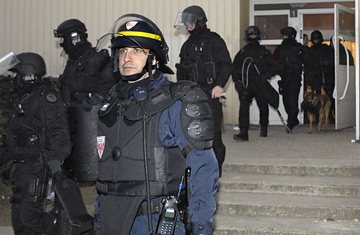
French police leave a building after launching raids in the Parisian suburb of Villiers-le-Bel
The operation was intended to strike a blow for law and order. On Monday more than 1,000 French riot cops raided apartments in several suburban housing projects north of Paris, arresting 33 of the 37 suspected leaders of ultra-violent rioting in the region last November. But along with cheers, the spectacular dawn raid reaped plenty of scorn. Former Socialist presidential candidate Segolene Royal called it "spectacle politics;" it was a mix "of justice and stage craft" in the opinion of centrist leader Francois Bayrou. Normal enough, of course, for the opposition to carp at government action. But this time there was some evidence giving credence to their complaints: scores of journalists had been tipped off and given access to ensure maximum coverage of the secret police operation.
The tempest erupted in the wake of police sweeps 12 miles north of Paris in and around Villers-le-Bel, the epicenter of rioting on the evenings of November 25 and 26 after the accidental deaths of two local youths whose motorbike collided with a patrol car. That violence failed to ignite the kind of nationwide unrest that broke out in housing projects across France for nearly three weeks in the autumn of 2005. But police and the government were troubled by the unprecedented degree of organization and communication by riot leaders, who apparently aimed to inflict as much damage as possible on police forces. Not only did the Villiers-le-Bel insurgents use strategic ambush points to stockpile and unleash stones, bottles and Molotov cocktails on security forces, they also repeatedly fired shotguns on riot cops, in what amounted to the most serious use of arms in nearly three decades of such periodic violence. The result was over 100 police officers injured in the mayhem — five seriously from shotgun fire, including one cop who lost an eye.
Monday's raid to nab suspected leaders of that outbreak made good on vows by French President Nicolas Sarkozy in November that such violence "can not remain unpunished." But on Monday Sarkozy's political rivals questioned whether the real objective of the busts wasn't instead to stage a diversion to the President's plunging approval ratings with a bit of heart-stirring crime fighting for the nation's media to lap up. Such high-profile law-and-order activity, Sarkozy's detractors allege, might also help limit losses the right is expected to suffer should voters use nationwide municipal elections next month to express dismay with the national leadership of Sarkozy and his ruling majority.
"When cameras cover massive police operations during municipal campaigning, I indeed think it's a manner of influencing opinion, [and] of wanting to create fear," Royal told France Inter radio following the sweeps. If so, it wasn't the first time police and media activities in France's troubled housing projects were apparently used for political communication. In the autumn of, 2006, for example, units of over 100 riot cops staged raids in two troubled suburbs west of Paris with scores of journalists in tow — in both cases making few arrests, with no charges ultimately filed. At the time, Sarkozy was busy building his presidential hopes on the tough, law-and-order reputation he was carving out as Interior Minister, especially in France's blighted, disorderly suburban projects.
Given the scenes Monday of microphones being thrust into doorways stormed by riot police, and the virtual integration of journalists within the operation, there is no doubt the media was a desired presence. But by whom? Participating reporters said they were alerted as early as last Friday by officials of unions representing police officers. Interior Minister Michele Alliot-Marie strongly condemned those "leaks that produced such significant media attention to this operation" — ones that she noted "could have had grave consequences" for its success. Other government officials similarly scoffed at the notion of Sarkozy or his cabinet else risking the apprehension of suspected riot leaders in the interest of electoral shenanigans. So what's the real story behind the raids?
"Whenever we've investigated previous police action the press was in on, the trail has always stopped with police unions, and never led to Sarkozy or the government in verifiable fashion," says Daniel Schneidermann, media critic for the daily Liberation. "We'll probably never know where the initiative for leaking began. The thing to watch is how many suspects are detained and tried in the days and weeks after this sweep, once the media attention dies down. If a lot are, then this was a genuine police operation. If not, we can put it mostly down to spin."
